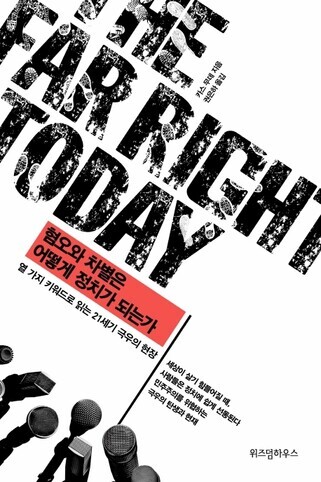hankyoreh
Links to other country sites 다른 나라 사이트 링크
[Book review] How to protect liberal democracy against far-right politics

Donald Trump may have failed in his bid for reelection as US president, but the base that made him president in the first place hasn’t much changed. Far right administrations remain in place in Brazil and India. Together, those represent three of the five most populous countries in the world.
In the European Union (EU), far right majority parties exist in Poland and Hungary, and far right politicians have established firm footings in other countries as well.
Cas Mudde is a Dutch political scientist who has spent the past 25 years studying the far right. In his book “The Far Right Today,” recently published in Korean translation, he characterizes the recent phenomenon as a “fourth wave” of far-right politics.
“The third wave, roughly from 1980 till 2000, saw the rise of electorally successful populist radical right parties,” he writes. “In the fourth wave, which roughly started in the twenty-first century, radical right parties have become mainstreamed and increasingly normalized, not just in Europe, but across the world.”
“And even extreme right parties have emerged, as extreme right sentiments (like antisemitism, historical revisionism, and racism) are openly flirted with in the media and politics,” he adds.
South Korea may be no exception to the trend — consider the so-called “Taegukgi army,” “Anti-Japan Tribalism,” and acts of hatred and discrimination toward social minorities.
Mudde’s book is intended to provide a popular audience with an introduction to far-right political phenomena. It takes a look at the history of the far right in the 21st century and its ideology, organization, key figures and activities.
After a comprehensive examination of the background and factors behind the phenomenon’s emergence, he stresses how we should respond. He finishes by showing how powerful a force gender discrimination has been in the far right, before stating “twelve theses” on the fourth wave in closing.

His analysis of the causes is of particular note. He examines the key issues surrounding far-right politics — questions like whether its emergence signifies protest against the political establishment or originates in actual support for far right forces, whether economic insecurity is a cause of far right support or represents a form of cultural backlash, whether the phenomenon is global or regional in nature, and whether it is the result of outstanding leadership or strong organization.
He also explores how much the media, in particular, have contributed to the rampant far right trend.
What is the proper response to the far right? Mudde emphasizes strengthening liberal democracy as the ultimate goal in responding to the far right. He stresses the importance of not losing sight of a key paradox: if we restrict the far right’s freedom as a way of combating it, we are ultimately just taking one step closer to the far right’s aim of destroying the liberal democratic system.
By Kim Jin-cheol, staff reporter
Please direct comments or questions to [english@hani.co.kr]

Editorial・opinion
![[Editorial] Penalties for airing allegations against Korea’s first lady endanger free press [Editorial] Penalties for airing allegations against Korea’s first lady endanger free press](https://flexible.img.hani.co.kr/flexible/normal/500/300/imgdb/original/2024/0502/1817146398095106.jpg) [Editorial] Penalties for airing allegations against Korea’s first lady endanger free press
[Editorial] Penalties for airing allegations against Korea’s first lady endanger free press![[Editorial] Yoon must halt procurement of SM-3 interceptor missiles [Editorial] Yoon must halt procurement of SM-3 interceptor missiles](https://flexible.img.hani.co.kr/flexible/normal/500/300/imgdb/child/2024/0501/17145495551605_1717145495195344.jpg) [Editorial] Yoon must halt procurement of SM-3 interceptor missiles
[Editorial] Yoon must halt procurement of SM-3 interceptor missiles- [Guest essay] Maybe Korea’s rapid population decline is an opportunity, not a crisis
- [Column] Can Yoon steer diplomacy with Russia, China back on track?
- [Column] Season 2 of special prosecutor probe may be coming to Korea soon
- [Column] Park Geun-hye déjà vu in Yoon Suk-yeol
- [Editorial] New weight of N. Korea’s nuclear threats makes dialogue all the more urgent
- [Guest essay] The real reason Korea’s new right wants to dub Rhee a founding father
- [Column] ‘Choson’: Is it time we start referring to N. Korea in its own terms?
- [Editorial] Japan’s rewriting of history with Korea has gone too far
Most viewed articles
- 1Months and months of overdue wages are pushing migrant workers in Korea into debt
- 2Trump asks why US would defend Korea, hints at hiking Seoul’s defense cost burden
- 31 in 3 S. Korean security experts support nuclear armament, CSIS finds
- 4[Editorial] Penalties for airing allegations against Korea’s first lady endanger free press
- 5Bills for Itaewon crush inquiry, special counsel probe into Marine’s death pass National Assembly
- 6[Guest essay] Maybe Korea’s rapid population decline is an opportunity, not a crisis
- 760% of young Koreans see no need to have kids after marriage
- 8Korean firms cut costs, work overtime amid global economic uncertainties
- 9[Editorial] Yoon must halt procurement of SM-3 interceptor missiles
- 10Fruitless Yoon-Lee summit inflames partisan tensions in Korea